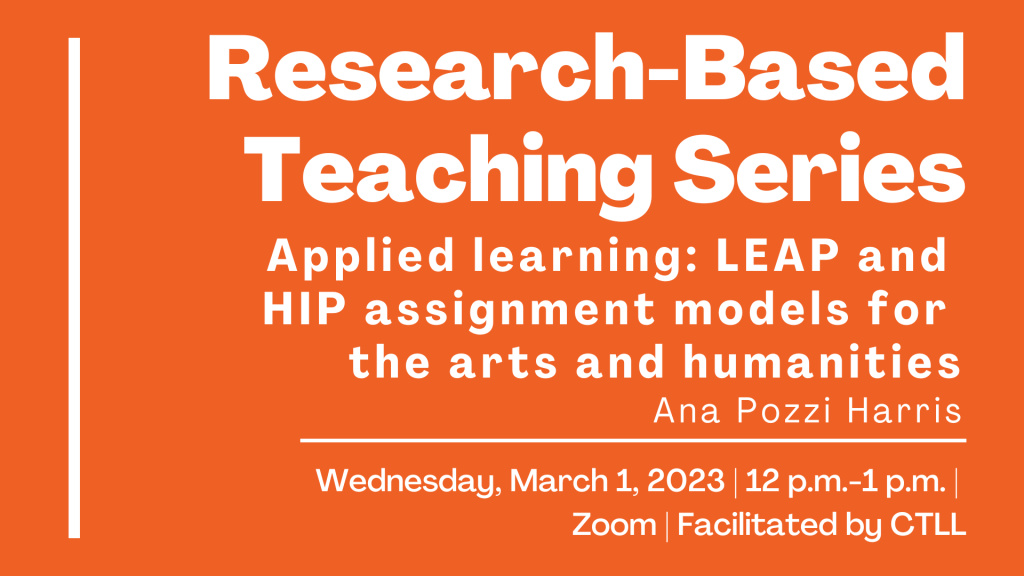
Date: Wednesday, March 1, 2023
Time: 12:00 p.m. – 1:00 p.m.
Location: Zoom
Find out more information and register.
Topic: Applied Learning: LEAP and HIP assignment models for the arts and humanities
Led by: Ana Pozzi Harris
Applied learning is a LEAP (Liberal Education and America’s Promise) essential learning outcome. In this workshop, you will join in discussion about three assignments in which applied learning is integrated with High Impact Practices (HIPs), such as final projects (or scaled-down versions of capstone projects), e-portfolios, collaborative projects, and community-based learning. These assignments are suitable for arts and humanities courses—especially art history, music history, theater history, film history, literature history, and modern language courses.
Find out more information, here.
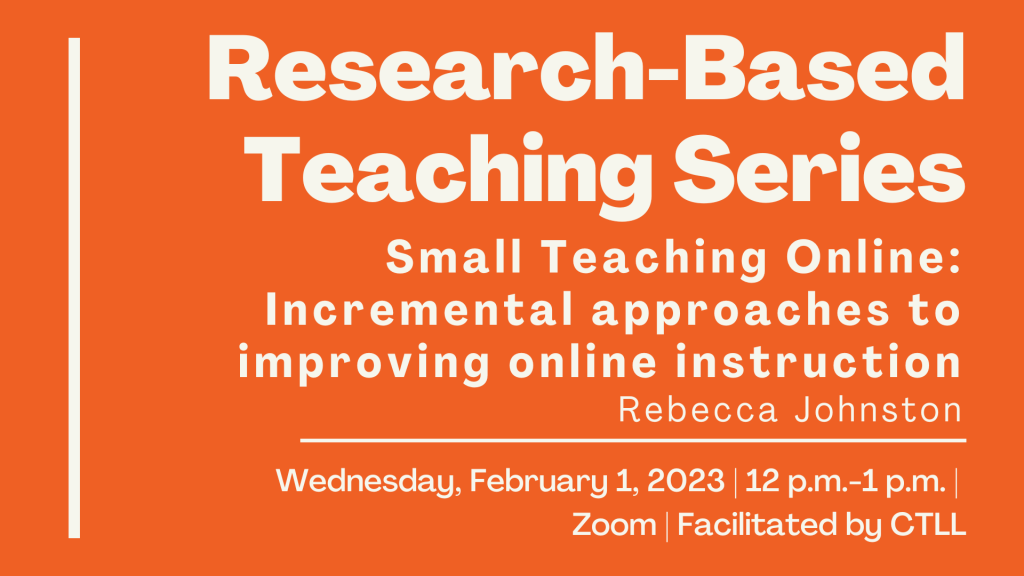
Date: Wednesday, February 1, 2023
Time: 12:00 p.m. – 1:00 p.m.
Location: Zoom
Find out more information and register.
Topic: Small Teaching Online: Incremental approaches to improving online instruction
Led by: Rebecca Johnston
Small teaching is a phrase coined by James M. Lang to describe an incremental approach to improving our instruction. Darby Flowers joins forces with Lang to also address online teaching. They explain how minor modifications to our teaching can have a major impact on student learning. In this session you will learn some of the small teaching strategies that have worked and discuss small teaching concepts. By making slight changes to your online class activities, there is a significant improvement in student engagement.
Find out more information, here.
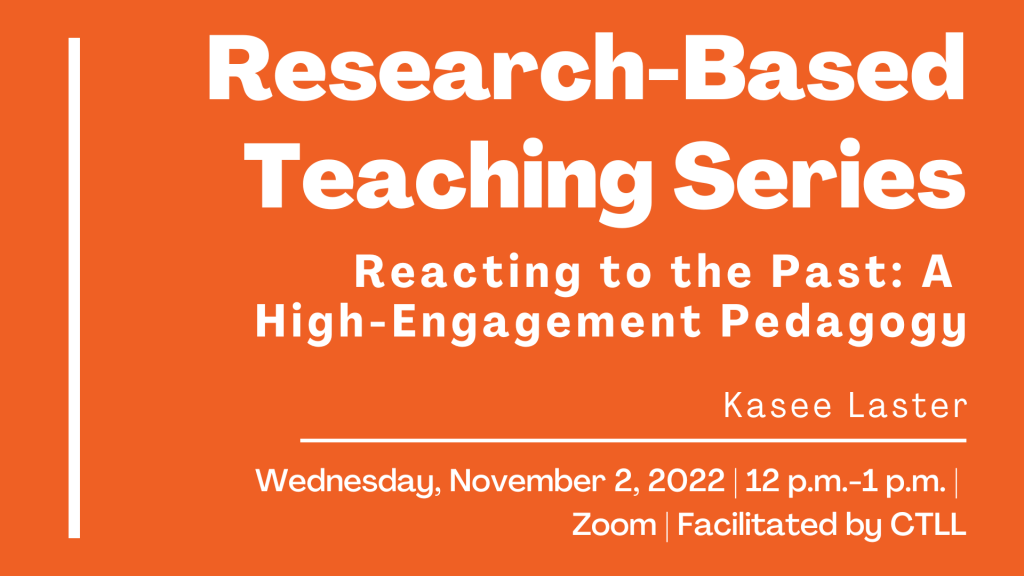
Date: Wednesday, November 2, 2022
Time: 12:00 p.m. – 1:00 p.m.
Location: Zoom
Find out more information and register.
Topic: Reacting to the Past: A High-Engagement Pedagogy
Led by: Kasee Laster
Reacting to the Past is a dynamic, interactive style of pedagogy which originated in the 1990s at Barnard College and has been put to work in hundreds of classrooms in the US and internationally, in history, rhetoric, lab sciences, philosophy, religion, political science, sociology, and so on.
Learn how Reacting to the Past harnesses students’ natural competitiveness and love of “play” in the service of academic goals and particularly deep learning.
Find out more information, here.
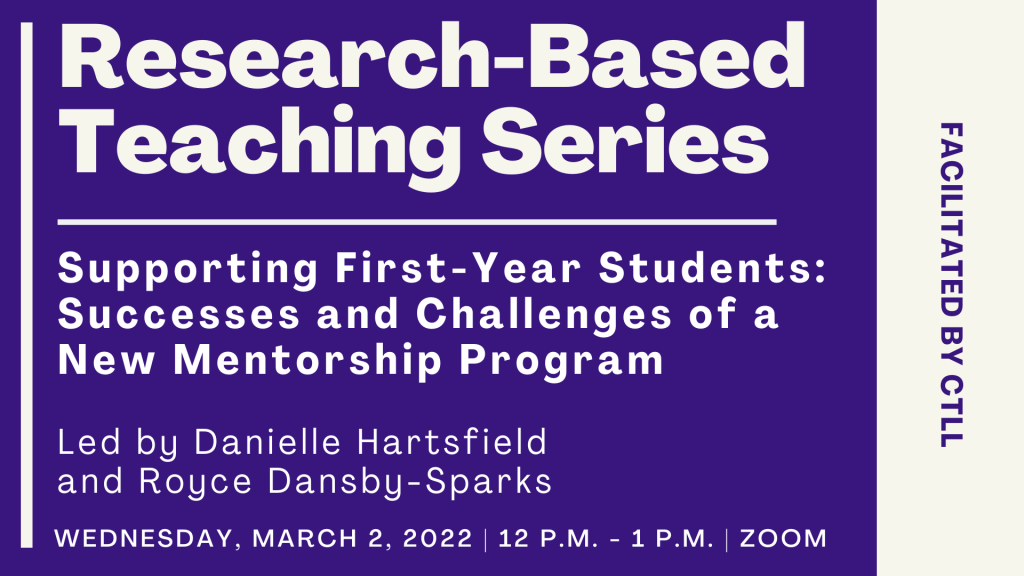
Date: Wednesday, March 2, 2022
Time: 12:00 p.m. – 1:00 p.m.
Location: Zoom
Find out more information and register.
Topic: Supporting First-Year Students: Successes and Challenges of a New Mentorship Program
Led by: Danielle Hartsfield and Royce Dansby-Sparks
The Mentorship Affinity Group project is a new program aimed at facilitating informal mentor/mentee relationships between first-year Honors students and faculty. Workshop participants will learn 1) how the Mentorship Affinity Group program was implemented, 2) and the program’s successes and challenges. The workshop will be informative to faculty, staff, and administrators who wish to increase faculty/student interaction, which could yield positive outcomes such as greater retention rates, academic achievement, and increased collaboration on research and creative activities.
RBTS seeks to support the work of faculty from all disciplines, colleges, and campuses by offering faculty presentations and workshops on best practices in teaching and learning. These workshops not only provide information and resources for faculty seeking to enhance their own pedagogical practices, but also give faculty an opportunity to present their work to peers. All sessions will be live on Zoom and video-recorded for archival purposes.
Find out more information, here.
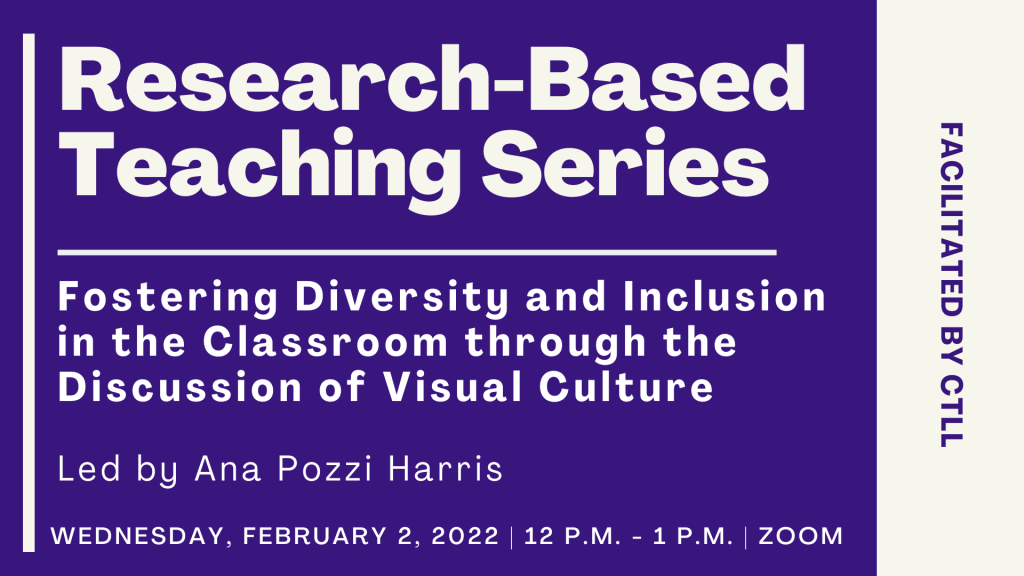
Date: Wednesday, February 2, 2022
Time: 12:00 p.m. – 1:00 p.m.
Location: Zoom
Find out more information and register.
Topic: Fostering Diversity and Inclusion in the Classroom through the Discussion of Visual Culture
Led by: Ana Pozzi Harris
Modeling a classroom activity applicable for all academic levels, this workshop will demonstrate the potential of using art images and images of visual culture to introduce discussions about diversity and inclusion as part of course content. Images used represent forms of identity, affirmation, social protest, and awareness about issues of the present day. The learning outcomes of this activity are for participants to connect learned information with their own social experiences of race and gender, and to collaborate with other participants to enrich their multicultural perspective.
RBTS seeks to support the work of faculty from all disciplines, colleges, and campuses by offering faculty presentations and workshops on best practices in teaching and learning. These workshops not only provide information and resources for faculty seeking to enhance their own pedagogical practices, but also give faculty an opportunity to present their work to peers. All sessions will be live on Zoom and video-recorded for archival purposes.
Find out more information, here.
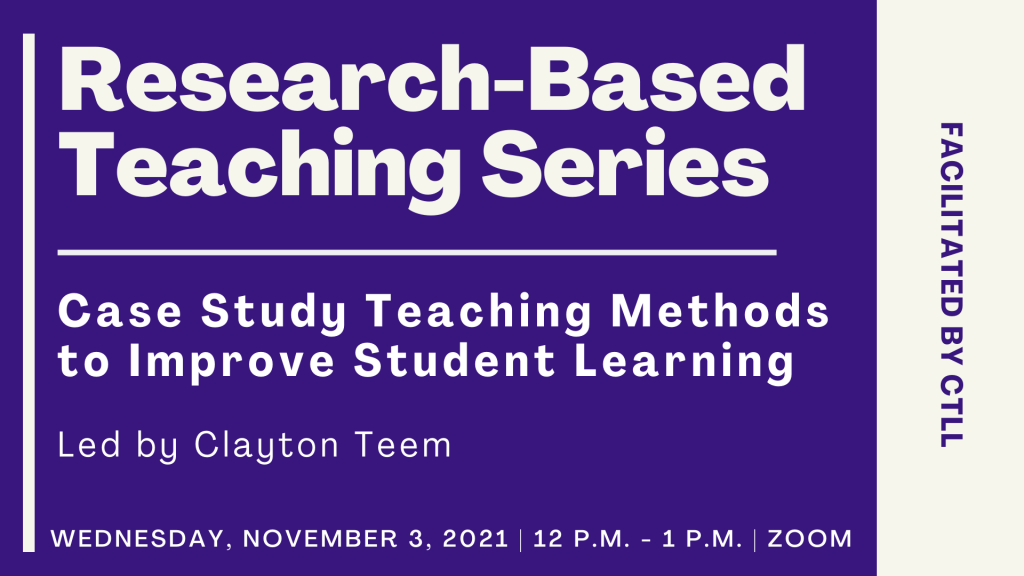
Date: Wednesday, November 3, 2021
Time: 12:00 p.m. – 1:00 p.m.
Location: Zoom
Find out more information and register.
Topic: Case Study Teaching Methods to Improve Student Learning
Led by: Clayton Teem
Case studies are used in many fields to enhance knowledge and application of subject matter. Yet, research suggests that many students do not learn as much from case studies because the students lack enough of an internal framework to understand the important points and detect meaningful data patterns; that is, students are relatively novice learners working towards a greater mastery of course material from professors who are comparative experts. This presentation will review some techniques to help students expand their understanding derived from case studies, e.g., “talking aloud,” visual illustration of essential vs non–essential information, and using small team discussion forums
RBTS seeks to support the work of faculty from all disciplines, colleges, and campuses by offering faculty presentations and workshops on best practices in teaching and learning. These workshops not only provide information and resources for faculty seeking to enhance their own pedagogical practices, but also give faculty an opportunity to present their work to peers. All sessions will be live on Zoom and video-recorded for archival purposes.
Find out more information, here.
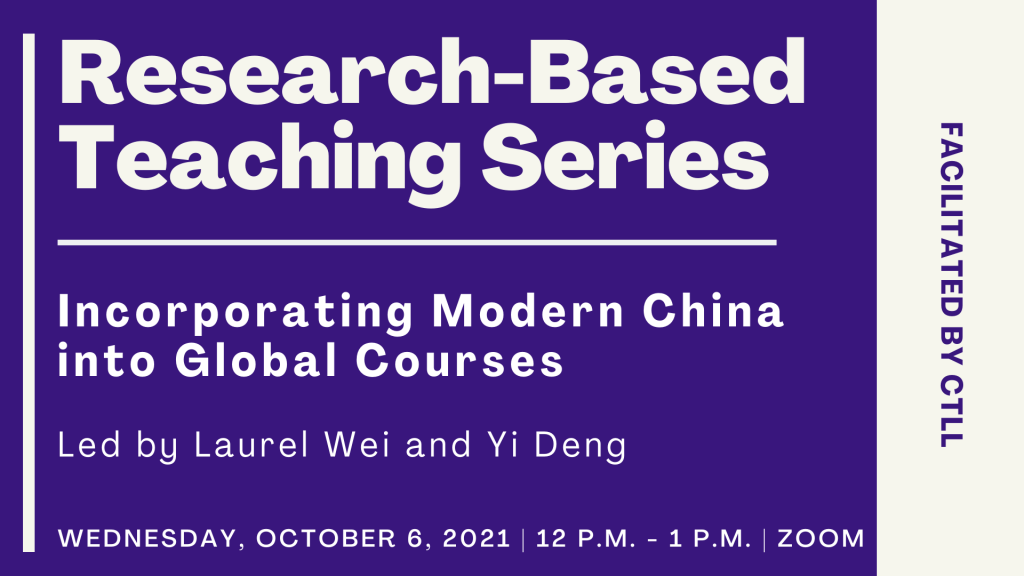
Date: Wednesday, October 6, 2021
Time: 12:00 p.m. – 1:00 p.m.
Location: Zoom
Find out more information and register.
Topic: Incorporating Modern China into Global Courses
Led by: Laurel Wei and Yi Deng
Inspired by their participation in the East-West Center’s 2021 summer institute, Dr. Deng and Dr. Wei will discuss their respective strategies in teaching global courses related to China. Dr. Deng will introduce a high-impact practice integrating Chinese art, film, and philosophy to undergraduate research for PHIL2200. Dr. Wei will discuss active learning strategies for POLS 2401, which aim at effectively achieving the dual learning objectives of content and language acquisition through a simulation and a creative research project.
RBTS seeks to support the work of faculty from all disciplines, colleges, and campuses by offering faculty presentations and workshops on best practices in teaching and learning. These workshops not only provide information and resources for faculty seeking to enhance their own pedagogical practices, but also give faculty an opportunity to present their work to peers. All sessions will be live on Zoom and video-recorded for archival purposes.
Find out more information, here.

Date: March 1, 2021
Time: 12:00 p.m. – 1:00 p.m.
Location: Zoom Webinar
RBTS seeks to support the work of faculty from all disciplines, colleges, and campuses by offering faculty presentations and workshops on best practices in teaching and learning. These workshops not only provide information and resources for faculty seeking to enhance their own pedagogical practices, but also give faculty an opportunity to present their work to peers. All sessions will be live on Zoom and video-recorded for archival purposes.
Topic: Blended (Hybrid) Course Learning and Teaching in Action
Led by: Lisa Diehl
Find out more information and register.
Find out more information, here.
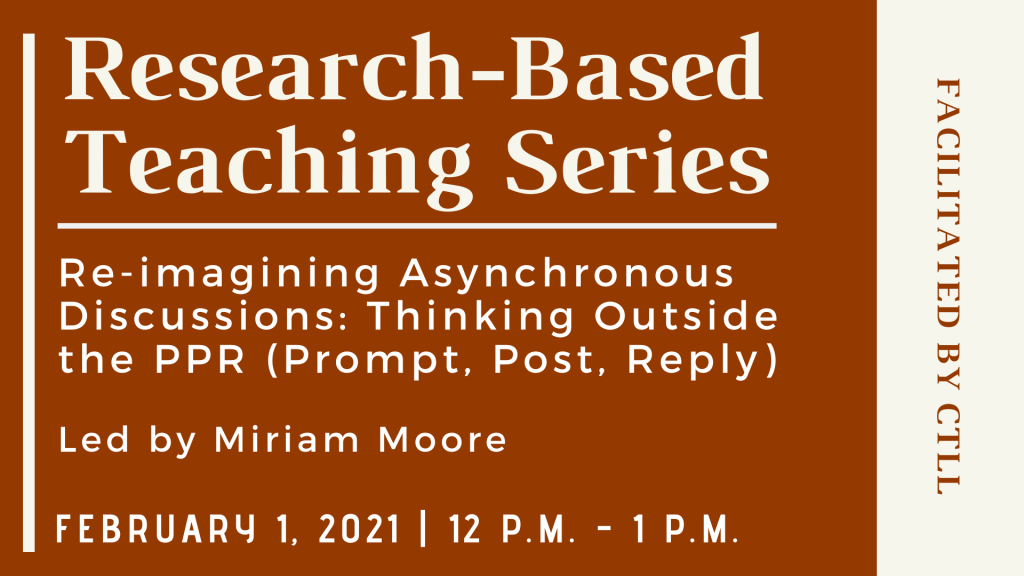
Date: February 1, 2021
Time: 12:00 p.m. – 1:00 p.m.
Location: Zoom Webinar
RBTS seeks to support the work of faculty from all disciplines, colleges, and campuses by offering faculty presentations and workshops on best practices in teaching and learning. These workshops not only provide information and resources for faculty seeking to enhance their own pedagogical practices, but also give faculty an opportunity to present their work to peers. All sessions will be live on Zoom and video-recorded for archival purposes.
Topic: Re-imagining Asynchronous Discussions: Thinking
Outside the PPR (Prompt, Post, Reply) Box
Led by: Miriam Moore
Find out more information and register.
Find out more information, here.
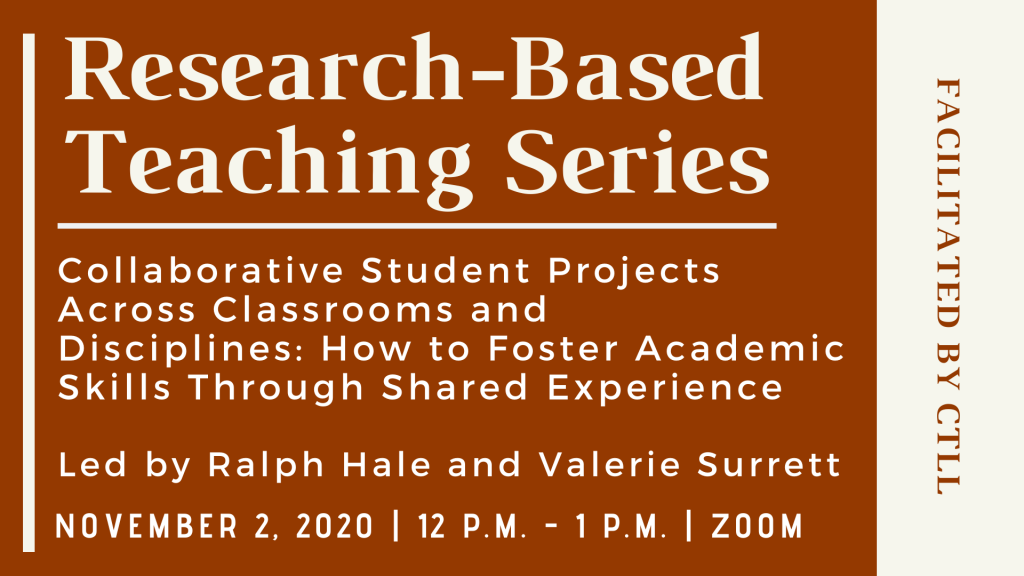
Date: November 2, 2020
Time: 12:00 p.m. – 1:00 p.m.
Location: Zoom Webinar
RBTS seeks to support the work of faculty from all disciplines, colleges, and campuses by offering faculty presentations and workshops on best practices in teaching and learning. These workshops not only provide information and resources for faculty seeking to enhance their own pedagogical practices, but also give faculty an opportunity to present their work to peers. All sessions will be live on Zoom and video-recorded for archival purposes.
Topic: Collaborative Student Projects Across Classrooms and Disciplines:
How to Foster Academic Skills Through Shared Experience
Led by: Ralph Hale and Valerie Surrett
Find out more information and register.
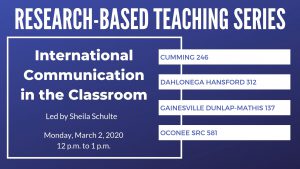
Led by: Sheila Schulte
Time: 12:00 p.m. – 1:00 p.m.
Locations:
Cumming Campus | 246
Dahlonega Campus | Hansford 312
Gainesville Campus | Dunlap-Mathis 137
Oconee Campus | SRC 581
How do we can we best assist non-native speakers of English in the classroom setting? This session is devoted to sharing model practices to ensure a positive learning environment for a diverse student body. After a basic review of intercultural communication theory, there will be a panel discussion with UNG international students, followed by an open discussion.
To register for workshops, please fill out our Workshop Registration form or email rsvp.ctll@ung.edu.
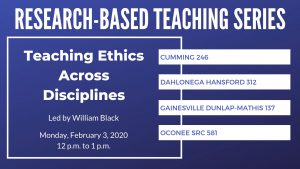
Led by: William Black
Time: 12:00 p.m. – 1:00 p.m.
Locations:
Cumming Campus | 246
Dahlonega Campus | Hansford 312
Gainesville Campus | Dunlap-Mathis 137
Oconee Campus | SRC 581
Many of us believe teaching ethics is important, but how do we know if we are making progress? The ARBC instrument (Action Research into Business Conduct) provides a measuring tool that can be used to diagnose current levels of perceptions about ethics, or used as a pretest / posttest evaluation of whether ethics instruction is effective. ARBC is a free online tool, created at the University of North Georgia that can support action research efforts to improve ethics instruction. The scenarios it asks participants to evaluate are drawn from common everyday situations that may have ethical implications. ARBC can be useful in contexts beyond business courses, for example in confirming assurance of learning measurements of progress towards ethics awareness goals.
This session will illustrate how to use ARBC in ethics assessment, and provide examples of ongoing research that is being conducted using ARBC.
To register for workshops, please fill out our Workshop Registration form or email rsvp.ctll@ung.edu.
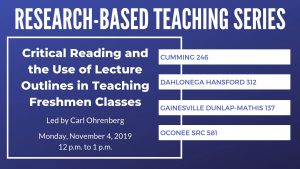
Led by: Carl Ohrenburg
Time: 12:00 p.m. – 1:00 p.m.
Locations:
Cumming Campus | 246
Dahlonega Campus | Hansford 312
Gainesville Campus | Dunlap-Mathis 137
Oconee Campus | SRC 581 Because of a scheduling conflict, Oconee participants will attend in Administration 108.
Critical Reading is an essential skill for our students, yet we often spend little time on helping them develop it. The way one reads a particular text varies widely depending on content and audience and students often lack the skill set to read certain types of writing. To address this, lecture outlines have been developed for use with teaching General Chemistry courses to college freshmen. These outlines represent a first step in developing critical reading skills in the sciences and provide a template for students to incorporate textbook reading with in class material. They are designed to help the students organize the content, as well as, engage the textbook on their own. This presentation will introduce the concept of the lecture outlines and explore their effectiveness in teaching General Chemistry.
To register for workshops, please fill out our Workshop Registration form or email rsvp.ctll@ung.edu.
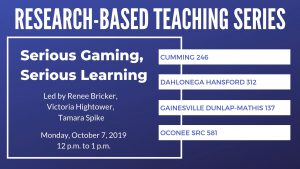
Led by: Tam Spike, Renee Bricker, and Victoria Hightower
Time: 12:00 p.m. – 1:00 p.m.
Locations:
Cumming Campus | 246
Dahlonega Campus | Hansford 312
Gainesville Campus | Dunlap-Mathis 137
Oconee Campus | SRC 581
“Serious gaming” in the classroom is growing in popularity. Serious games can take many forms: computer games, board games, puzzles, etc. This presentation will focus on role-playing games and simulations. Within these games, students take on roles informed by historical sources and/or current events. There is no fixed script, no predetermined outcome. Students are guided by the philosophical and intellectual beliefs of the people they have been assigned to play, and seek to achieve their goals in papers, speeches, other kinds of public presentations, or subrosa alliances and other machinations. Gamification of difficult, complex, real-world situations reinforces concepts, creates greater engagement, and provides multiple means of approaching course material as well as develops skills in speaking, writing, critical thinking, problem solving, leadership, and teamwork.
To register for workshops, please fill out our Workshop Registration form or email rsvp.ctll@ung.edu.

Wednesday, March 7, 2018
12:00 p.m. to 1:00 p.m.
Best Practices for Significant Learning in the Flipped Classroom
Led by Sarah Formica, Associate Professor of Physics
There’s more to a flipped classroom than reading assignments and pre-lecture videos. Students need to engage with the material, each other, and their instructor to have significant learning experiences. This workshop will provide you with the opportunity to experience a flipped classroom, as well as tools and strategies you can use to flip your own. There will be a pre-workshop assignment and group activities during the workshop, so come prepared and ready to engage.
Blue Ridge Campus | Room 107
Cumming Campus | Room 246
Dahlonega Campus | Dunlap Hall 211B
Gainesville Campus | Nesbitt 3211
Oconee Campus | 318
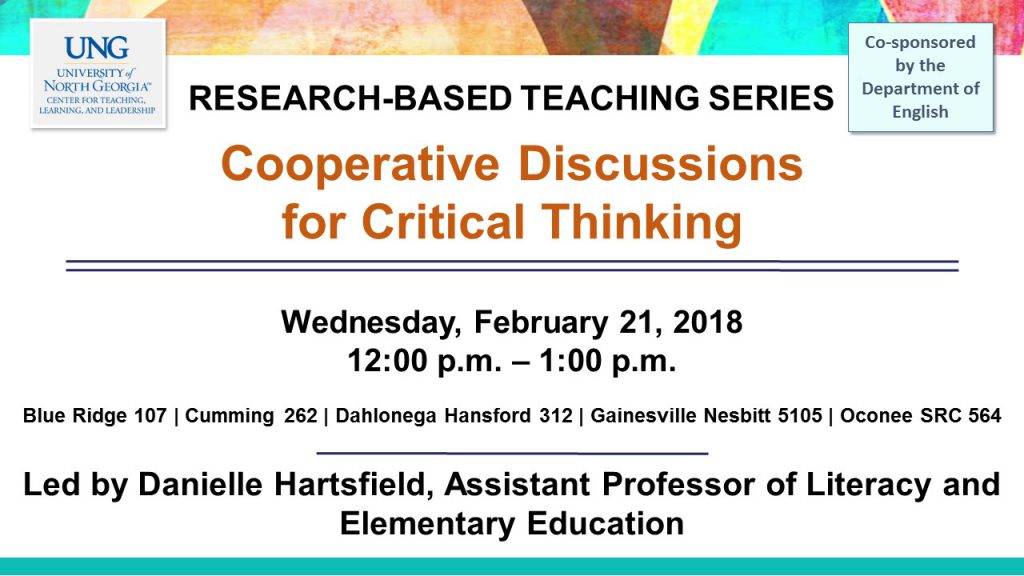
Wednesday, February 21, 2018
12:00 p.m. to 1:00 p.m.
Cooperative Discussions for Critical Thinking
Led by Danielle Hartsfield, Assistant Professor of Literacy and Elementary Education
Sometimes students in small group discussions don’t generate the kind of deep, critical thinking that instructors desire. This workshop will teach participants how to scaffold text-based small group discussions to promote critical thinking and student engagement with texts in face-to-face and online settings (including D2L).
Blue Ridge Campus | Room 107
Cumming Campus | Room 262
Dahlonega Campus | Hansford 312
Gainesville Campus | Nesbitt 5105
Oconee Campus | SRC 564
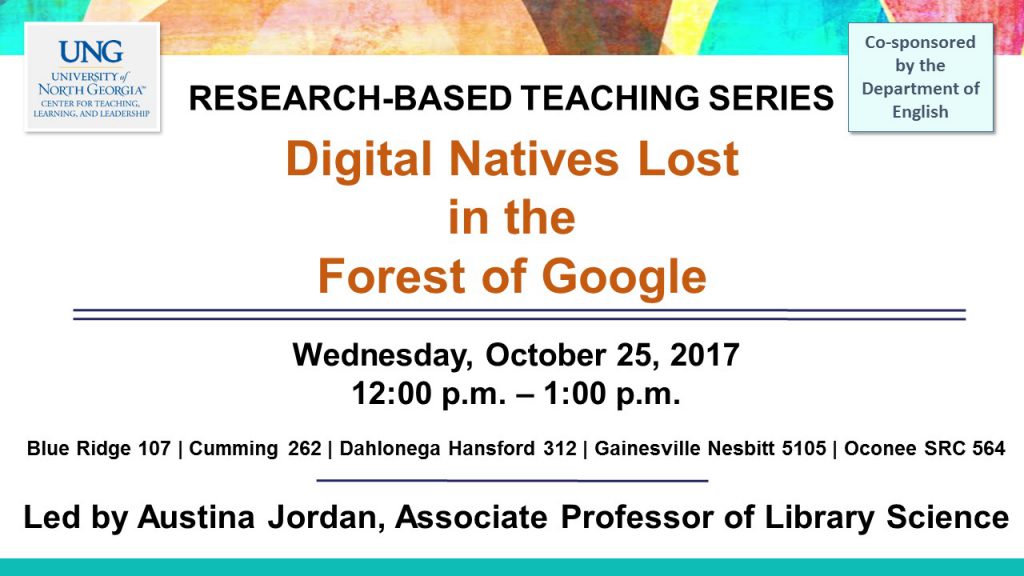 Wednesday, October 25, 2017
Wednesday, October 25, 2017
12:00 p.m. to 1:00 p.m.
Digital Natives Lost in the Forest of Google
Led by Austina Jordan, Associate Professor of Library Science/Collection Management Librarian
There is no shortage of information in the world. Fake news abounds or so we are told. If you google “Fake News” you get 164,000,000 hits. If you search that same term in Galileo you get 465,331 results. What’s the difference? Why does it matter? Research is an integral part of the academic journey. Teachers design research based assignments with numerous objectives in mind. This session will help professors understand how students actually research, how they understand research assignments and what they do for help in the process.
Blue Ridge Campus | Room 107
Cumming Campus | Room 262
Dahlonega Campus | Hansford 312
Gainesville Campus | Nesbitt 5105
Oconee Campus | SRC 564
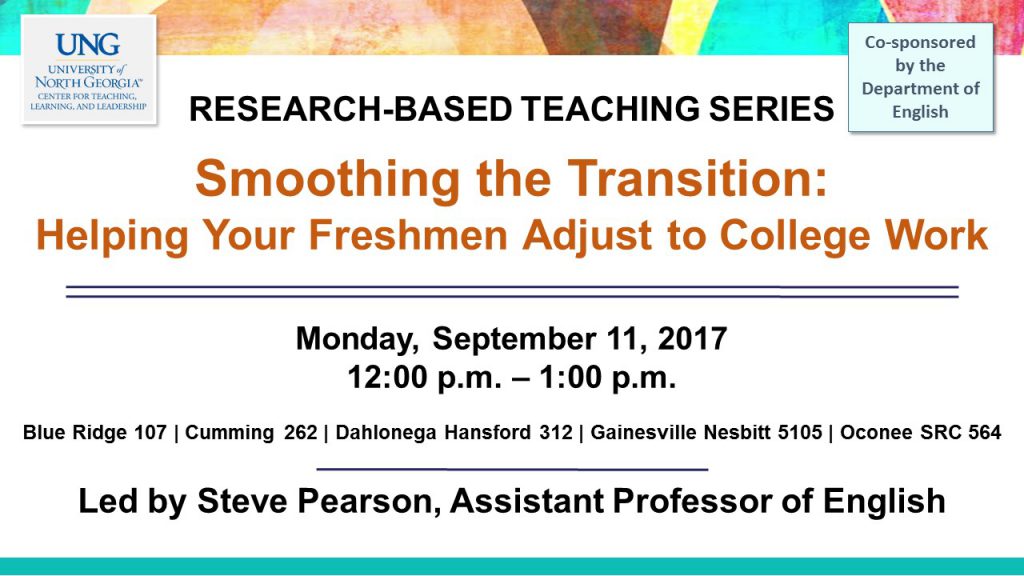 Led by Steve Pearson, Assistant Professor of English
Led by Steve Pearson, Assistant Professor of English
Monday, September 11, 2017
12:00 p.m. to 1:00 p.m.
This workshop will present retention issues that can be addressed early in students’ coursework and will ask faculty to brainstorm solutions. Obstacles with research, not understanding expectations, retention problems, and students’ backgrounds are all difficulties that students face. Because of all of these issues can be addressed, and hopefully prevented, by faculty, this presentation will ask faculty to consider ways that we can address them in first-year courses.
Blue Ridge Campus | Room 107
Cumming Campus | Room 262
Dahlonega Campus | Hansford 312
Gainesville Campus | Nesbitt 5105
Oconee Campus | SRC 564
Register here.
Blue Ridge Campus | 107
Cumming Campus | 262
Dahlonega Campus | Hansford 312
Gainesville Campus | Nesbitt 5105
Oconee Campus | 564
Facilitator, Diana Edelman
Presenter, Jennifer Schneider
Part of the Research-Based Teaching Series
Research has shown that human interaction is linked to positive student experiences. However, human interaction is not confined to the classroom. Motivating students to engage in the course material earlier in the education process could lead to richer learning experiences. This workshop will discuss whether blended learning is a viable option in modern classrooms.
This workshop is presented on all campuses via video teleconference.
Blue Ridge Campus | 107
Cumming Campus | 246
Dahlonega Campus | Hansford 312
Gainesville Campus | Nesbitt 5105
Oconee Campus | 564
Facilitator, Diana Edelman
Presenters, Molly Daniel, Matthew Boedy, and Jim Shimkus
Part of the Research-Based Teaching Series
Molly Daniel, Matthew Boedy, and Jim Shimkus will show examples from their own student feedback, as examples of effective and ineffective marks. This workshop will also address how to use effective feedback to counter the long slog of composition courses. In short, having more effect with less comments. We will discuss how writing center tutoring aids in your view of feedback and offer a handout that can you refer to for better feedback.
This workshop is presented on all campuses via video teleconference.

















